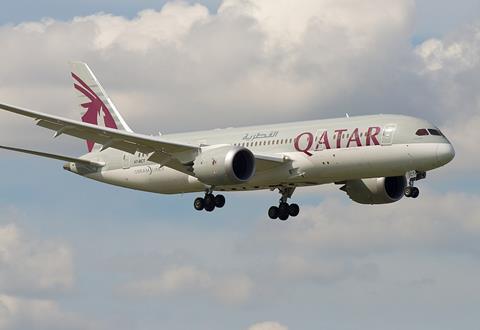Qatar Airways chief Badr Mohammed Al-Meer believes airframers need to take tougher measures with suppliers to address delays to aircraft deliveries.
Speaking at the Qatar Economic Forum in Doha on 15 May, he acknowledged that Boeing and Airbus are each having to cope with supply-chain difficulties.
“But they need to put more pressure on those suppliers to make sure airlines stop bleeding,” he says.
“Demand in the industry has picked up, it’s very high. Unfortunately for passengers, for our customers, we’re not able to meet their demand because of the shortage of aircraft in the market.”
Al-Meer says the company “expects and depends” on suppliers to meet deadlines, in order for its commercial division to conduct fleet resource planning for pilots and cabin crew.
“Whenever the deadline keeps slipping, it means all our [planning] was a waste, basically,” he says.

Qatar Airways is seeking to reduce its fleet complexity, Al-Meer adds, pointing out that it has been operating eight different Airbus and Boeing aircraft types – and several variants within them.
“Having [this many] different types of aircraft in our fleet is putting pressure on us when it comes to maintenance, spare parts, training our pilots, training our cabin crew,” he says.
Fleet consideration is part of a broad review of the airline’s strategy, which Al-Meer dubs ‘Qatar Airways 2.0’.
Reducing the number of aircraft types – in conjunction with a fleet tender issued by the carrier a few months ago – is intended to produce “more consistency [in what] we’re giving our passengers” and a “better streamline in our operation”, he adds.
He has not disclosed which aircraft types might be trimmed from the carrier, stating that this decision “depends on the answer we get from both Boeing and Airbus through the tender”.
Boeing has taken the opportunity to reinforce its Qatari aviation presence with the establishment of a new entity in the emirate, Boeing Aerospace Doha, an agreement for which was signed during the forum with Invest Qatar.
The US airframer says it will strengthen the local aerospace sector and workforce through research, technology and innovation, supporting start-ups and sustainable aviation.
Boeing says the new division will complement its other operations in the Gulf state.
“This expanded collaboration will consolidate our position as the leading aerospace partner to Qatar, providing societal and economic benefits in line with Qatar’s third National Development Strategy and the Qatar National Vision 2030,” says Boeing Middle East president Kuljit Ghata-Aura.


























